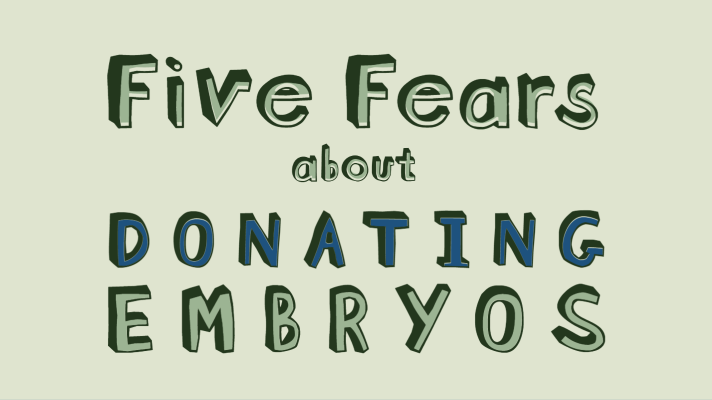Deciding whether or not to donate your remaining embryos after your family is complete is HARD.
There is no easy way to make this decision—it involves little lives that you put a lot of love and effort to create, only to come to the realization you will not be able to go through another IVF transfer to add them to your family (for whatever your specific situation or reason may be).
Embryo donation is the only life-giving option for your remaining embryos. It can be an incredible thing; it gives another family just like you who, for whatever reason, IVF not work out for them (or was not even an option in the first place) to experience pregnancy, birth, and parenthood.
Even if you know and feel that embryo donation is the right choice for your family, there can be many fears and questions surrounding the decision.
How intense is the donation process? Will I have to tell my family and friends about the donation process? Who will receive our embryos? Will we know if a baby has been born? Will the child try to find out who I am in the future? concerning?
And the dreaded, “What if our child and their children meet someday and don’t know each other?!”
However, many of the initial fears placing parents may have when considering embryo donation are built on falsehoods and misrepresentations. Below are five common fears many families have when first contemplating donating their remaining embryos, how you can face them with truth and information!
1. Donating our embryos means that everyone will know we went through IVF to build our family.
This can be a huge fear for many families, especially families who may have used an egg or sperm donor while going through IVF and have not told their children their conception story yet. If you choose to donate your embryos, this does not automatically mean you have to share your struggles with infertility from the mountain tops for all to hear.
However, the most important people involved in your life, like your spouse, your closest family members, and especially your children (when they are old enough to understand), should be made aware of your story and your decision to donate the remaining embryos. This can make it easier when your sharing your story with a potential adoptive family, knowing that the most important people in your life also know about your story. We advise that before you jump into the donation process, to normalize and grow comfortable with your story, and share it with those who need to know.
2. We just cannot come to terms with the idea that someone unknown would be raising our child.
Who would be receiving our embryos? What is their family life like? Do they hold the same values and beliefs as us? Unfortunately, if you choose to donate through your fertility clinic, the recipient family will be anonymous.
But the donation does not have to be filled with unknowns and anonymity. If you choose to donate through an embryo adoption program or self-match, you can put forth criteria you require of any family who would receive your embryos and even choose the family yourself with some programs! You can also have peace of mind with embryo adoption programs that the adoptive families have pass criminal background checks and adoption education, which prepare them for raising a child who is not biologically their own.
3. Embryo donation takes too much time, intensity, and paperwork.
It is true, there is a lot that comes with facilitating an embryo donation. And if you are already overwhelmed with children, work, and day to day life, it’s understandable why you would not want to add more to your plate. If you are working with an embryo adoption program or clinic program, a lot of the administrative and logistical work is taken care of for you. You will still need to do updated blood work, and create a family profile (if you are going through an adoption program) but it is far less rigorous than it may seem at first.
4. Having an open placement or communication with the recipient family will be too painful.
While you may feel that having communication with the adoptive family would be too painful right now, you most likely will not feel that way once the embryos have been donated and a baby is born. The child will seem more like theirs—like the baby was meant to be in their family all along.
The adoptive family is more like you than you may realize… They struggled with infertility, they had a strong desire to experience pregnancy and childbirth, and they are forever grateful to you for giving them the gift of parenthood. They want you to share in their joy and happiness! Because you have been there yourself.
5. Our children will unknowingly meet their genetic siblings one day and fall in love!
While this may seem like a ridiculous and silly fear to have, it is not like it has never happened before. This is another benefit of open adoption—knowing who the recipient family is and information on their lives and whereabouts will eliminate the risk of your children and the children born into the recipient family from running into each other unknowingly. They may even form a cousin relationship with each other if you have more of an open relationship with the recipient family!
To learn more about embryo donation, you can watch our webinar Donation and Other Options for Remaining Embryos, or visit our website EmbryoAdoption.org.


Recent Comments